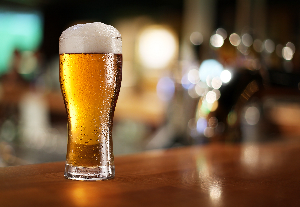4 Things the Home Craft Beer Brewer Should Know About Water
Good water makes great beer. Since beer is 91 to 97 percent water, depending on the brew, it pays to start every craft beer batch with the best water you can get. It’s also wise to have your water conditioned, since a water-treatment system is the best way to precisely control the pH, hardness, and mineral content of your beer’s main ingredient.
 Read on to find out more about home brewing and water.
Read on to find out more about home brewing and water.
The pH Goes Down as You Brew
Water’s pH is measured by the salts and organic compounds it contains. It’s a measure of acidity or alkalinity. A pH of 7 is a neutral reading, while any pH above 7 is a base. Water with a pH below 7 is considered acidic.
As you brew, the beer components will fluctuate in pH readings. Your initial brew water should be in the 6 to 7 range; mash should have a pH from 5.2 to 5.5; and your finished beer should read from 4 to 5 on the scale. In essence, the brew becomes more acidic as it ferments.
Find out the pH of your municipal water by requesting a report from the water utility. The utility should provide you with a month-by-month breakdown of the pH and other minerals in your public water. If not, hire a water treatment company to do multiple checks throughout the year to test your water quality for consistency, especially if you’re on a well or alternative water source.
Water Hardness Affects Beer Quality
Water’s hardness or softness is measured by how much calcium and magnesium are dissolved in it. Other dissolved solids including metals and minerals may be factored in a hardness reading.
Minerals cause strange things to happen to beer, whether there is too much of a substance or not enough in the recipe. Too much calcium may deprive yeast of nutrients, while too little calcium causes hazing. Magnesium is a yeast nutrient that adds flavor to beer in the correct amounts, but makes beer harsh and bitter if there’s too much in the water.
Your water should also be monitored for both too little and too much sodium, sulfates, bicarbonates, and chlorides. These minerals affect your beer’s taste, appearance, and dryness.
Adding Ingredients Is One Way to Compensate
The residual alkalinity (RA) of water is an important consideration in the finished beer you make with it. The best beer-brewing water has an RA value of less than 1, but higher values may be offset by the overall balance of mineral ions in the original water or by adding ingredients.
For most brewers, the mash stage is when the pH is of major importance. Since the mash relies on malt enzymes, and enzymes are choosy about pH, it’s been customary for brewers to add ingredients at this stage to lower the pH. Traditional methods of lowering mash pH include increasing malt, adding gypsum, and relying on biological acids. Today’s brewers often add food-grade acids including lactic acid and phosphoric acid to enhance the enzyme action.
Mineral salts are often added back to water, especially if water is too soft. Depending on the beer quality you seek (and the softness of your water), you may add one to three teaspoons of mineral salts to a five-gallon recipe. Some mineral salts added include:
- Epsom
- Gypsum
- Calcium chloride
- Chalk
- Baking soda
If your water is too soft, consider adding these.
The Best Brewing Filtration System Depends on Your Water
It’s best to have a comprehensive evaluation performed on your water—no matter its source—to determine the pH, hardness, and RA value. Even though you may receive one from your water utility, your water softener professionals will check the water actually coming out of your taps. There may be vast differences between treatment plant readings and your home water values.
When you provide your water treatment professional with your “dream” water values, you can have filters and/or conditioners installed that create the levels you want for your brew water. Carbon filtration is one solution. It doesn’t remove minerals, but does remove contaminants and some chloramines.
Many large-scale brewers choose reverse osmosis (RO) as a pre-treatment for their water. RO creates “pure” water devoid of minerals. Brewers simply add the ones they want in more precise, brew-friendly concentrations. RO doesn’t remove chlorine, so secondary charcoal filtration is recommended.
Many brewers prefer to use water that’s harder than water should be for other household purposes, including laundry, bathing, and dishwashing. A water treatment professional can install conditioners on part of the water line, or you can have a non-conditioned line run to your brewing equipment.
Whether you’re trying to get iron and sulfur out of your beer-brewing water, or you want softer water for the whole family, Johnson Water Conditioning is ready to purify your pipes. Call us today to find out what’s in your water before you make the next batch.

 Better Water for
a Better Life
Better Water for
a Better Life
